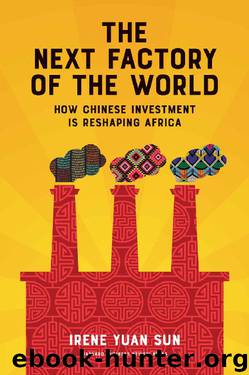The Next Factory of the World: How Chinese Investment Is Reshaping Africa by Irene Yuan Sun

Author:Irene Yuan Sun [Sun, Irene Yuan]
Language: eng
Format: epub
Tags: 21st Century, Africa, Business & Economics, China, Economic Development, Entrepreneurship, Foreign Affairs, Industrial Management, Industries, Manufacturing
ISBN: 9781633692824
Google: IG6NDgAAQBAJ
Amazon: B01MUGYCME
Publisher: Harvard Business Press
Published: 2017-10-17T03:00:00+00:00
CHAPTER 6
Two Steps Forward, One Step Back
Stephen Sigei is a young Kenyan who recently graduated from a local vocational training school as a certified mechanic. He has loved machines all his life, tinkering endlessly with gears, old radios, and any other discarded machines he could get his hands on. He has long fingers and the short sentences of someone used to working with his hands. He smiles often when he talks about his work, a wide, winning, gap-toothed grin, even as he looks down shyly at the end of each sentence.
Stephen holds a remarkable distinction: in April 2016, together with two classmates, he exported US$100,000 worth of machine parts from Kenya to China. The three had won the contract in a national industrial skills competition, and they had worked the desk-size lathes and mills at their school for three months to complete the order. As a result, they got to split the profits—roughly $10,000—with their school.1 Stephen and his classmates are symbols of a new dream taking shape in Africa: that Africans can manufacture products good enough and efficiently enough to sell to the rest of the world. Currently, only 8 percent of Africa’s exports to China are manufactured goods, compared with 30 percent of China’s exports to Africa.2 Thus Stephen’s accomplishment has earned the attention of top policymakers in Kenya, who were still talking breathlessly about it months later. Onstage at a high-profile gathering of Kenyan and Chinese officials at the Intercontinental, one of the fanciest hotels in Nairobi, Dinah Jerotich Mwinzi, the principal secretary of the Kenyan Ministry of Education, recounted how she beamed as she watched the shipping container holding Stephen’s goods leave for China. “I looked at the container with machine spare parts made in Kenya,” she said. “It was such a moment of pride. We’re used to seeing goods from China, but this time, we are sending a whole container to China. We Kenyans exported to China!” she exclaimed, to boisterous applause from the audience.3
But Stephen’s real dream is even bigger: to have his own factory, producing spare parts for Kenya and beyond. That dream is part of the second possibility that industrialization can bring to Africa: a local capitalist class. However, despite his world-class skills and his share of the $10,000 from his first contract, Stephen has neither enough cash nor the credit to purchase the necessary machines. Whether he can ever become a factory owner will depend not only on hard work and determination—which Stephen has in spades—but also on the relationships he is able to forge with foreign investors. The latter can offer him a partnership or not, look out for his interests or not, believe in him or not. If Chinese investment in Africa is to spawn a generation not only of African workers but also of African industrialists who themselves own the means of production, multiple elements will be required: individual initiative, complementary business arrangements, and ultimately, that most nebulous of ingredients: personal trust.
…
Realizing Stephen’s dream of becoming a factory
Download
This site does not store any files on its server. We only index and link to content provided by other sites. Please contact the content providers to delete copyright contents if any and email us, we'll remove relevant links or contents immediately.
Life 3.0: Being Human in the Age of Artificial Intelligence by Tegmark Max(4536)
The Sports Rules Book by Human Kinetics(3612)
ACT Math For Dummies by Zegarelli Mark(3573)
The Age of Surveillance Capitalism by Shoshana Zuboff(3445)
Blood, Sweat, and Pixels by Jason Schreier(3149)
Unlabel: Selling You Without Selling Out by Marc Ecko(3004)
Urban Outlaw by Magnus Walker(2960)
Hidden Persuasion: 33 psychological influence techniques in advertising by Marc Andrews & Matthijs van Leeuwen & Rick van Baaren(2801)
The Pixar Touch by David A. Price(2753)
Bad Pharma by Ben Goldacre(2743)
Project Animal Farm: An Accidental Journey into the Secret World of Farming and the Truth About Our Food by Sonia Faruqi(2675)
Brotopia by Emily Chang(2600)
The Content Trap by Bharat Anand(2505)
Slugfest by Reed Tucker(2434)
The Airbnb Story by Leigh Gallagher(2386)
Kitchen confidential by Anthony Bourdain(2332)
Coffee for One by KJ Fallon(2024)
Smuggler's Cove: Exotic Cocktails, Rum, and the Cult of Tiki by Martin Cate & Rebecca Cate(2002)
Beer is proof God loves us by Charles W. Bamforth(1945)
